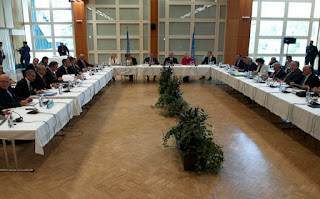Ninety Years after the October Revolution -- A Brief Comment
Plus ça change, plus c'est la même chose. Today’s posturing over missile defences, Kosovo, Iran, Iraq, and the practicalities of the CFE Treaty clearly suggest that Russia as in the past (especially the Cold War era) always wanted to be considered as an equal member in the club of global powers. Ninety years after the October Revolution, one could conclude that Russia demonstrates a marked continuity in its approach toward the rest of the world. A careful reading of history teaches us that Russia whether in its Tsarist, Soviet or Post-Cold War version remained and remains committed to the ambition of being a strong European power with a droit de regard over its neighbourhood, its “near abroad”. One of the reasons for the Communist Revolution of 1917 was that Tsarist Russia was considered to be the weak link in the Concert of Europe that had, in effect, ruled Europe with its Balance of Power concept since the end of the Napoleonic Wars. In other words, apart from creating a worker’s democracy, Russia’s revolutionaries dreamt of a powerful centrally-ruled Soviet Union dominant on the global stage.
This continuity seems accompanied by a change though which could imply a significant and qualitative difference from the past. This change is linked to Russia’s economic strength whereby the country boosted by high energy prices has repaid a lot of its Soviet-era international debt, covered Russian Pension Fund deficits and created a Stabilization Funds estimated at over 145 Billion USD today to provide for a rainy day, all at a time when the country’s average GDP grows at an annual average of 8%.
This continuity seems accompanied by a change though which could imply a significant and qualitative difference from the past. This change is linked to Russia’s economic strength whereby the country boosted by high energy prices has repaid a lot of its Soviet-era international debt, covered Russian Pension Fund deficits and created a Stabilization Funds estimated at over 145 Billion USD today to provide for a rainy day, all at a time when the country’s average GDP grows at an annual average of 8%.
Thus 90 years after the October Revolution, Russia remains committed to acquiring and maintaining Great Power status but with a booming economy which implies that today’s Russia could have a longer lifespan that its Soviet predecessor.


Comments